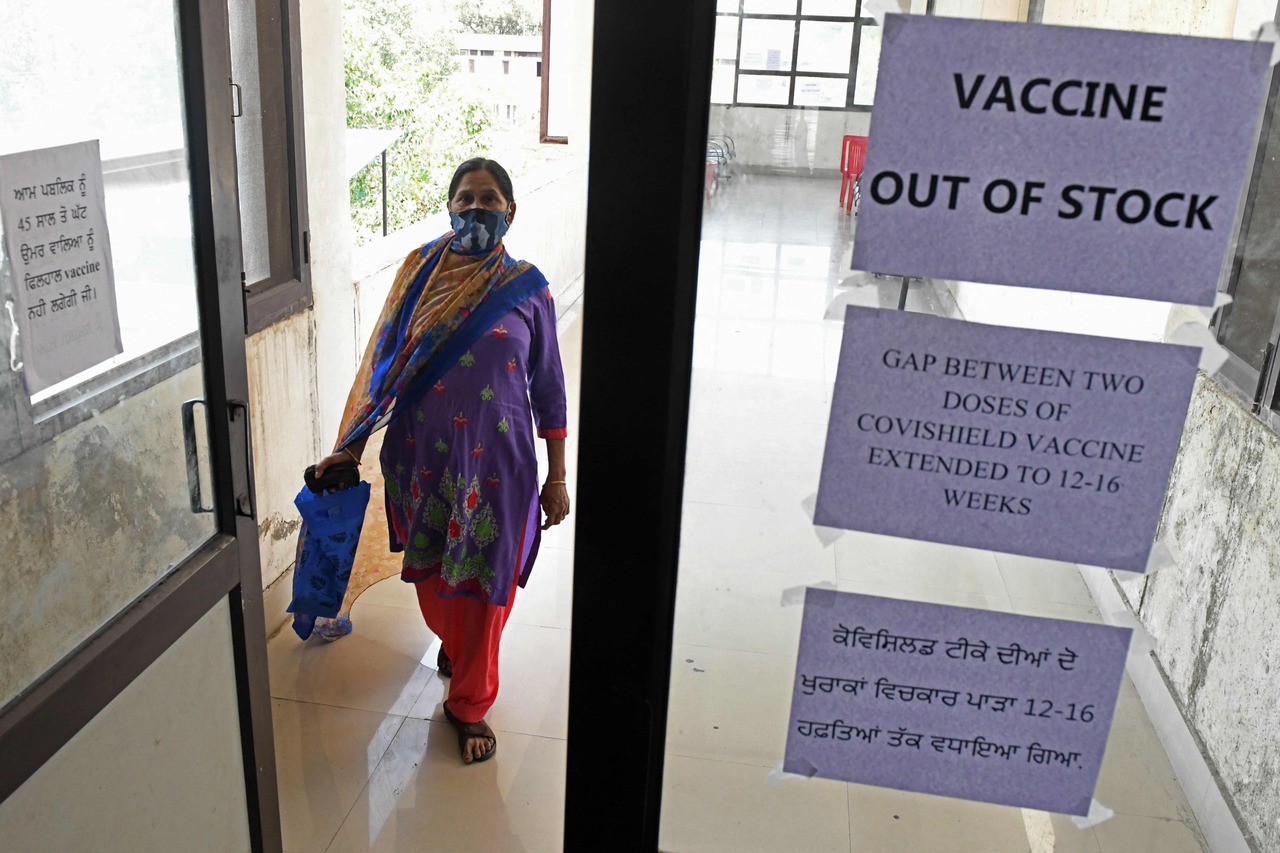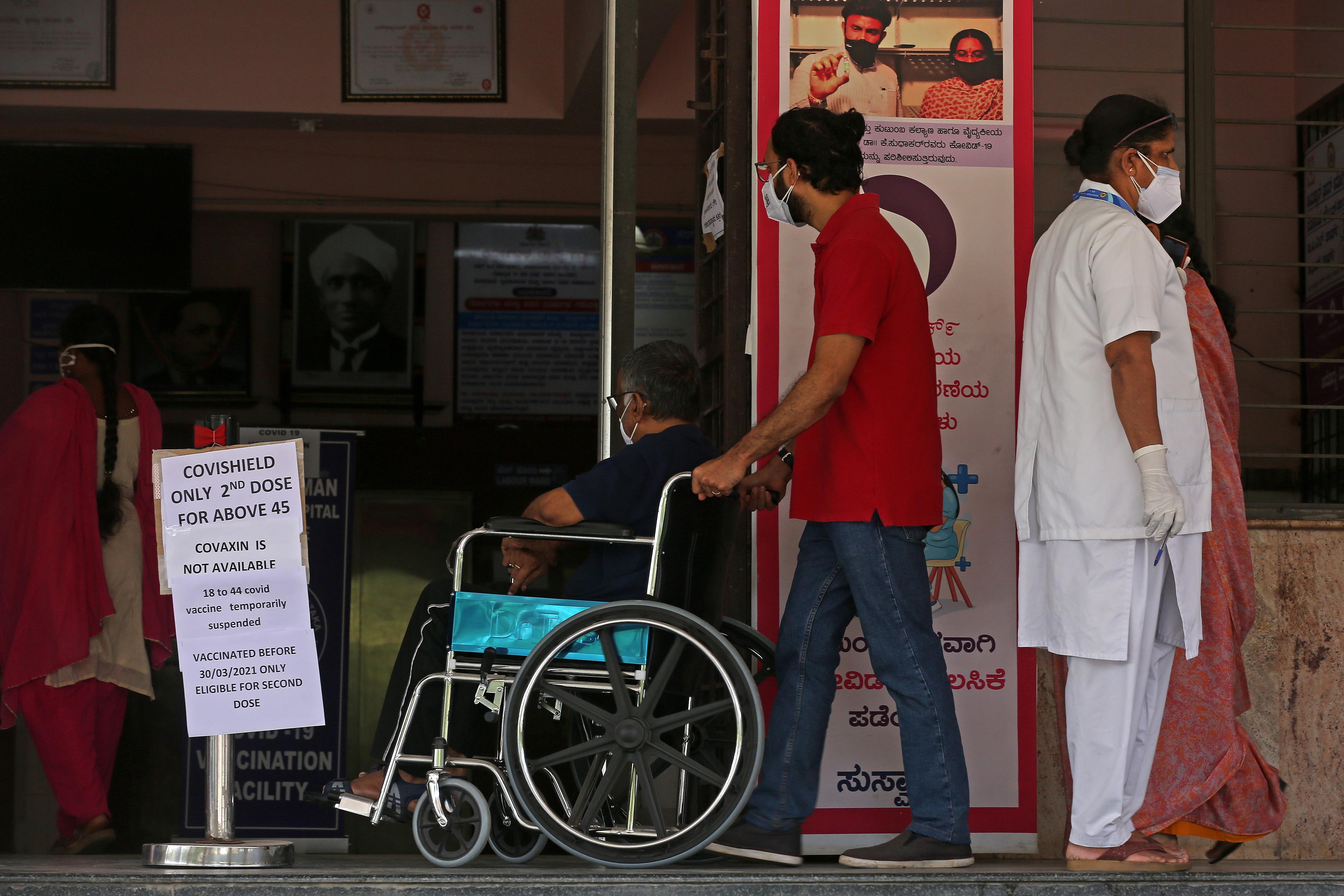Indian states and companies try to import Covid-19 vaccines but face bottlenecks
Sign up now: Get insights on Asia's fast-moving developments

A woman walks past notices displayed in a civil hospital in Amritsar, India, on May 17, 2021.
PHOTO: AFP
Follow topic:
BANGALORE - At least 10 Indian states and half a dozen private corporations have announced their intention to import Covid-19 vaccines through a global tender process, but most have yet to receive responses as other countries mop up the majority of foreign-made vaccines.
The Indian government's liberalised vaccination strategy has left the vaccination of people aged 18 to 44 to individual states from May 1. State governments have to buy the two approved domestic vaccines at prices fixed by the manufacturers or call for vaccine bids in an open market for imports. Any private player can also do the same.
Only three vaccines are currently approved by the Indian drug regulator: Bharat Biotech's indigenous Covaxin; Serum Institute of India's AstraZeneca, which is also called Covishield; and Russia's Sputnik V.
On April 13, as vaccine shortages were reported across the country, the Indian government announced the fast tracking of emergency approvals for foreign-made Covid-19 vaccines that have been approved in the United States, Europe, Japan and the United Kingdom, or included in the World Health Organisation's emergency-use listing.
Foreign vaccines can thus be directly imported and used after a "bridging clinical trial" in India.
Currently, the only foreign vaccine imported is Russia's Sputnik V. Hyderabad-based Reddy's Laboratories bought about 210,000 doses from Russia in recent weeks, and it will be available to Indians at 995.40 rupees (S$18.12) per dose. India gave the vaccine emergency approval in mid-April.
Asserting that the doses the central government allocated to them were not enough to cover the eligible population, Uttar Pradesh, Tamil Nadu, Odisha, Karnataka, Andhra Pradesh and Uttarakhand state governments, and the Mumbai city corporation invited foreign vaccine makers to tender by calling for expression of interest.
India's biggest conglomerates, including the Tata group, Larsen & Toubro (L&T) and Reliance Industries, are reportedly exploring options to import vaccines directly from manufacturers to inoculate their workforces.
An L&T spokesman told The Straits Times that the construction giant was "evaluating all available options" to boost its vaccination drive for employees who were yet to get the jab. "Our target is to get (vaccines) at the earliest - either through direct supply or through government centres," the e-mail said.
Economists Ajay Shah and Amrita Agarwal wrote in the Indian Express that the liberalised strategy increased the accessibility of multiple buyers to global vaccine supply.
But lawyer Murali Neelakantan and economist Ashish Kulkarni argued that it was akin to each standalone McDonald's franchise trying to independently procure the raw ingredients required to make burgers and fries.
The ineffectiveness of decentralised procurement was worsened by vaccines being in short supply globally, said Mr Neelakantan. Most supplies have been scooped by countries, with some like Canada and the US ordering enough to vaccinate their population twice or thrice over.
"Every Indian state and municipal corporation can put out tenders but no vaccine maker has billions of doses in an overseas warehouse. Everybody who has been producing vaccines overseas has already sold them before they have produced them," said Mr Neelakantan.

Even if foreign vaccine makers respond, experts say they are likely to favour private corporations that can afford to vaccinate their employees or sell the jabs through private hospitals to Indians who can afford to pay over 1,000 rupees per dose.
This could short-change state-sponsored Covid-19 vaccination programmes that cater to the majority of poorer Indians, thus deepening inequities in a public health crisis.
The city corporation of Mumbai, India's wealthiest city and one of the first epicentres of the coronavirus, called for expression of interest on May 12 to buy 10 million doses. But no manufacturer has responded within the deadline of a week.
Given global scarcity of vaccines, Mr Neelakantan said the only solution could be Indian vaccine makers bidding for these tenders.
For instance, Dr Reddy's will locally manufacture Sputnik V in a few months. Ahmedabad-based Zydus Cadilla also has an indigenous vaccine candidate in clinical trial, which could be available by June if approved. Serum and Bharat Biotech can also bid for state and corporate tenders.
Dr VK Paul from the government think-tank NITI Aayog said the Indian authorities were actively encouraging Moderna, Pfizer and Johnson & Johnson to apply for emergency approval.
American vaccine maker Pfizer had applied in December last year for emergency use authorisation in India and offered the central government "a not-for-profit price", said its chairman Albert Bourla.
However, the firm withdrew its application in February this year over the Indian regulator refusing to include an indemnity clause shielding Pfizer from legal liability related to the vaccine's effects.

